Exploring Managerial Roles: Challenges and Strategies in Australia
VerifiedAdded on 2023/06/14
|6
|1369
|118
Report
AI Summary
This report presents an analysis of an interview conducted with a senior manager in Australia to explore crucial managerial roles in the workplace. The manager's responses highlight the overlapping nature of these roles, including planning, organizing, staffing, directing, and controlling, and their impact on overall performance. Key challenges identified include staying ahead of rivals through competitive advantage, managing workplace diversity, dealing with globalization, managing technology, upholding ethical standards, ensuring business sustainability, and maintaining personal well-being. The report further discusses strategies for overcoming these challenges, such as aligning personal and organizational goals, promoting diversity and inclusion, fostering open communication, investing in training programs, and adhering to ethical codes of conduct. The analysis provides insights into the essential functions and challenges faced by senior managers and offers practical solutions for enhancing their effectiveness.
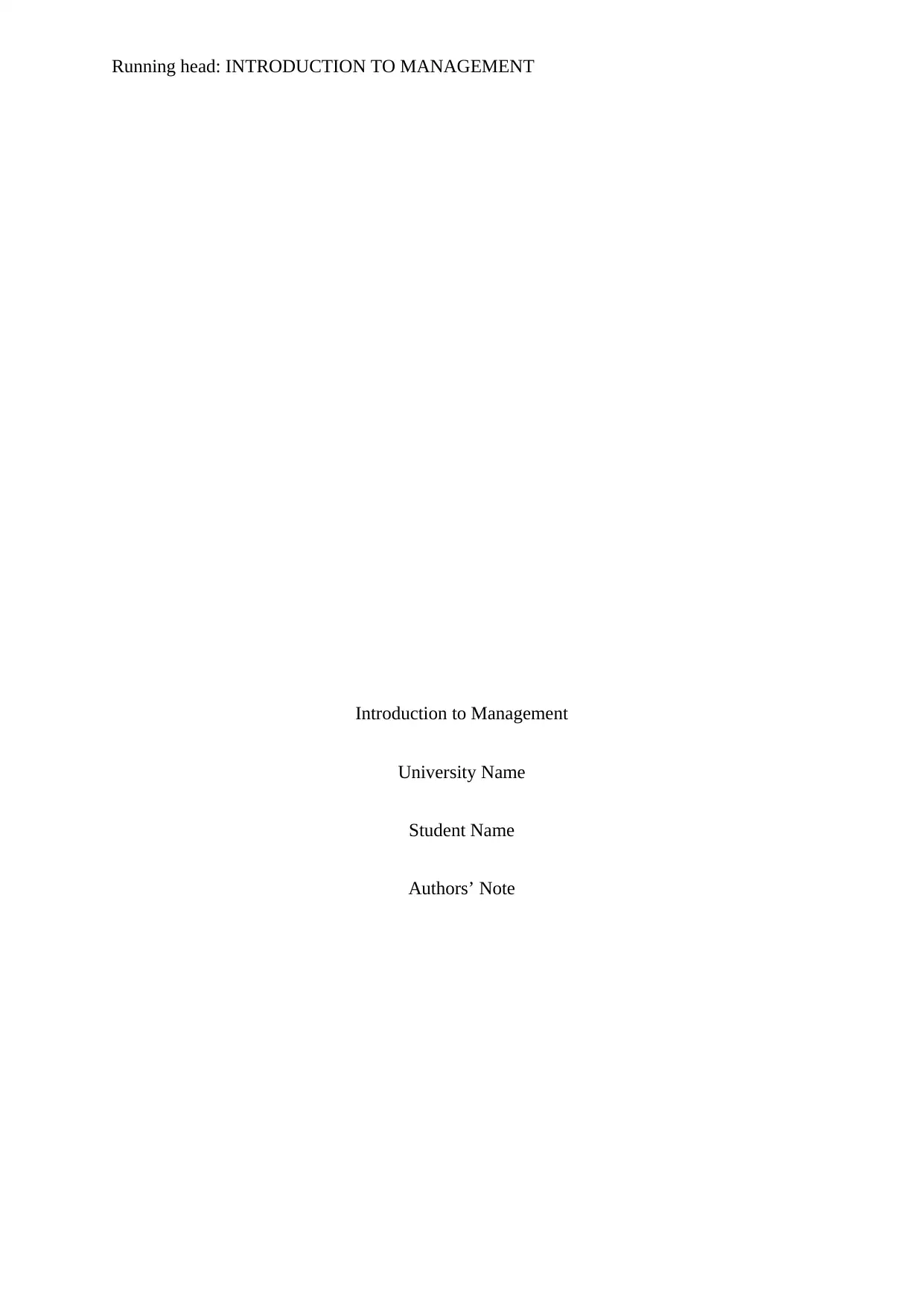
Running head: INTRODUCTION TO MANAGEMENT
Introduction to Management
University Name
Student Name
Authors’ Note
Introduction to Management
University Name
Student Name
Authors’ Note
Paraphrase This Document
Need a fresh take? Get an instant paraphrase of this document with our AI Paraphraser
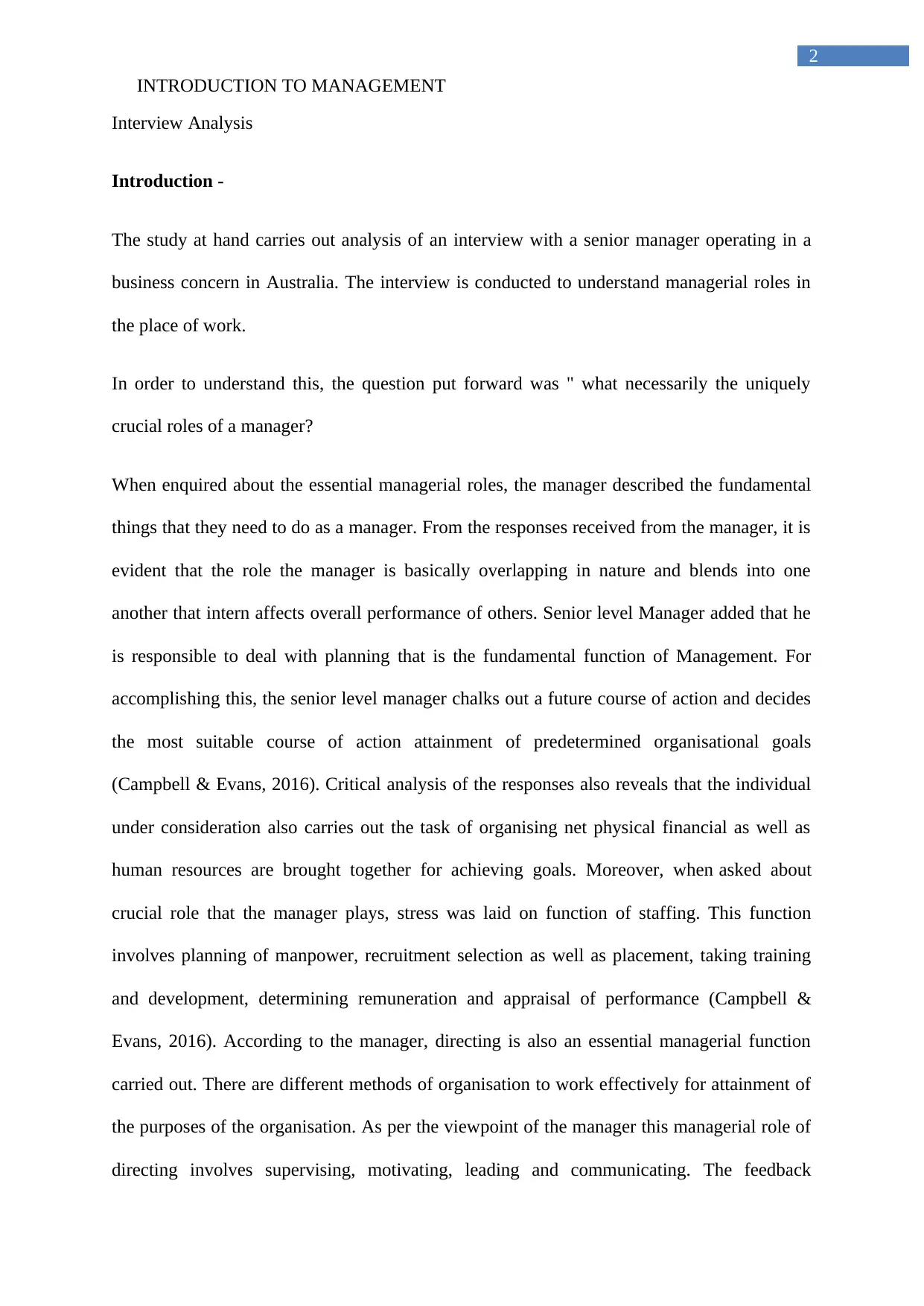
2
INTRODUCTION TO MANAGEMENT
Interview Analysis
Introduction -
The study at hand carries out analysis of an interview with a senior manager operating in a
business concern in Australia. The interview is conducted to understand managerial roles in
the place of work.
In order to understand this, the question put forward was " what necessarily the uniquely
crucial roles of a manager?
When enquired about the essential managerial roles, the manager described the fundamental
things that they need to do as a manager. From the responses received from the manager, it is
evident that the role the manager is basically overlapping in nature and blends into one
another that intern affects overall performance of others. Senior level Manager added that he
is responsible to deal with planning that is the fundamental function of Management. For
accomplishing this, the senior level manager chalks out a future course of action and decides
the most suitable course of action attainment of predetermined organisational goals
(Campbell & Evans, 2016). Critical analysis of the responses also reveals that the individual
under consideration also carries out the task of organising net physical financial as well as
human resources are brought together for achieving goals. Moreover, when asked about
crucial role that the manager plays, stress was laid on function of staffing. This function
involves planning of manpower, recruitment selection as well as placement, taking training
and development, determining remuneration and appraisal of performance (Campbell &
Evans, 2016). According to the manager, directing is also an essential managerial function
carried out. There are different methods of organisation to work effectively for attainment of
the purposes of the organisation. As per the viewpoint of the manager this managerial role of
directing involves supervising, motivating, leading and communicating. The feedback
INTRODUCTION TO MANAGEMENT
Interview Analysis
Introduction -
The study at hand carries out analysis of an interview with a senior manager operating in a
business concern in Australia. The interview is conducted to understand managerial roles in
the place of work.
In order to understand this, the question put forward was " what necessarily the uniquely
crucial roles of a manager?
When enquired about the essential managerial roles, the manager described the fundamental
things that they need to do as a manager. From the responses received from the manager, it is
evident that the role the manager is basically overlapping in nature and blends into one
another that intern affects overall performance of others. Senior level Manager added that he
is responsible to deal with planning that is the fundamental function of Management. For
accomplishing this, the senior level manager chalks out a future course of action and decides
the most suitable course of action attainment of predetermined organisational goals
(Campbell & Evans, 2016). Critical analysis of the responses also reveals that the individual
under consideration also carries out the task of organising net physical financial as well as
human resources are brought together for achieving goals. Moreover, when asked about
crucial role that the manager plays, stress was laid on function of staffing. This function
involves planning of manpower, recruitment selection as well as placement, taking training
and development, determining remuneration and appraisal of performance (Campbell &
Evans, 2016). According to the manager, directing is also an essential managerial function
carried out. There are different methods of organisation to work effectively for attainment of
the purposes of the organisation. As per the viewpoint of the manager this managerial role of
directing involves supervising, motivating, leading and communicating. The feedback
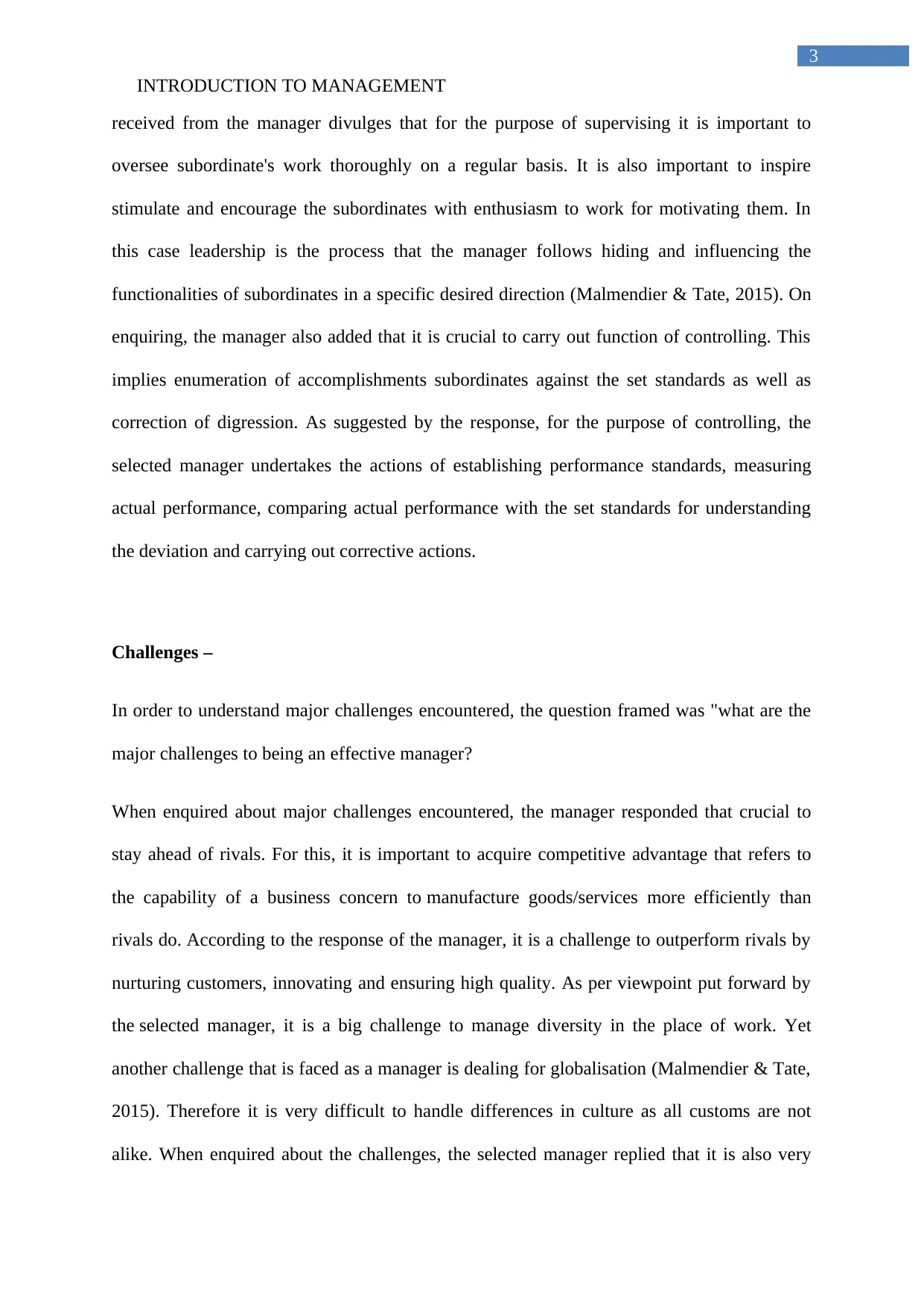
3
INTRODUCTION TO MANAGEMENT
received from the manager divulges that for the purpose of supervising it is important to
oversee subordinate's work thoroughly on a regular basis. It is also important to inspire
stimulate and encourage the subordinates with enthusiasm to work for motivating them. In
this case leadership is the process that the manager follows hiding and influencing the
functionalities of subordinates in a specific desired direction (Malmendier & Tate, 2015). On
enquiring, the manager also added that it is crucial to carry out function of controlling. This
implies enumeration of accomplishments subordinates against the set standards as well as
correction of digression. As suggested by the response, for the purpose of controlling, the
selected manager undertakes the actions of establishing performance standards, measuring
actual performance, comparing actual performance with the set standards for understanding
the deviation and carrying out corrective actions.
Challenges –
In order to understand major challenges encountered, the question framed was "what are the
major challenges to being an effective manager?
When enquired about major challenges encountered, the manager responded that crucial to
stay ahead of rivals. For this, it is important to acquire competitive advantage that refers to
the capability of a business concern to manufacture goods/services more efficiently than
rivals do. According to the response of the manager, it is a challenge to outperform rivals by
nurturing customers, innovating and ensuring high quality. As per viewpoint put forward by
the selected manager, it is a big challenge to manage diversity in the place of work. Yet
another challenge that is faced as a manager is dealing for globalisation (Malmendier & Tate,
2015). Therefore it is very difficult to handle differences in culture as all customs are not
alike. When enquired about the challenges, the selected manager replied that it is also very
INTRODUCTION TO MANAGEMENT
received from the manager divulges that for the purpose of supervising it is important to
oversee subordinate's work thoroughly on a regular basis. It is also important to inspire
stimulate and encourage the subordinates with enthusiasm to work for motivating them. In
this case leadership is the process that the manager follows hiding and influencing the
functionalities of subordinates in a specific desired direction (Malmendier & Tate, 2015). On
enquiring, the manager also added that it is crucial to carry out function of controlling. This
implies enumeration of accomplishments subordinates against the set standards as well as
correction of digression. As suggested by the response, for the purpose of controlling, the
selected manager undertakes the actions of establishing performance standards, measuring
actual performance, comparing actual performance with the set standards for understanding
the deviation and carrying out corrective actions.
Challenges –
In order to understand major challenges encountered, the question framed was "what are the
major challenges to being an effective manager?
When enquired about major challenges encountered, the manager responded that crucial to
stay ahead of rivals. For this, it is important to acquire competitive advantage that refers to
the capability of a business concern to manufacture goods/services more efficiently than
rivals do. According to the response of the manager, it is a challenge to outperform rivals by
nurturing customers, innovating and ensuring high quality. As per viewpoint put forward by
the selected manager, it is a big challenge to manage diversity in the place of work. Yet
another challenge that is faced as a manager is dealing for globalisation (Malmendier & Tate,
2015). Therefore it is very difficult to handle differences in culture as all customs are not
alike. When enquired about the challenges, the selected manager replied that it is also very
⊘ This is a preview!⊘
Do you want full access?
Subscribe today to unlock all pages.

Trusted by 1+ million students worldwide
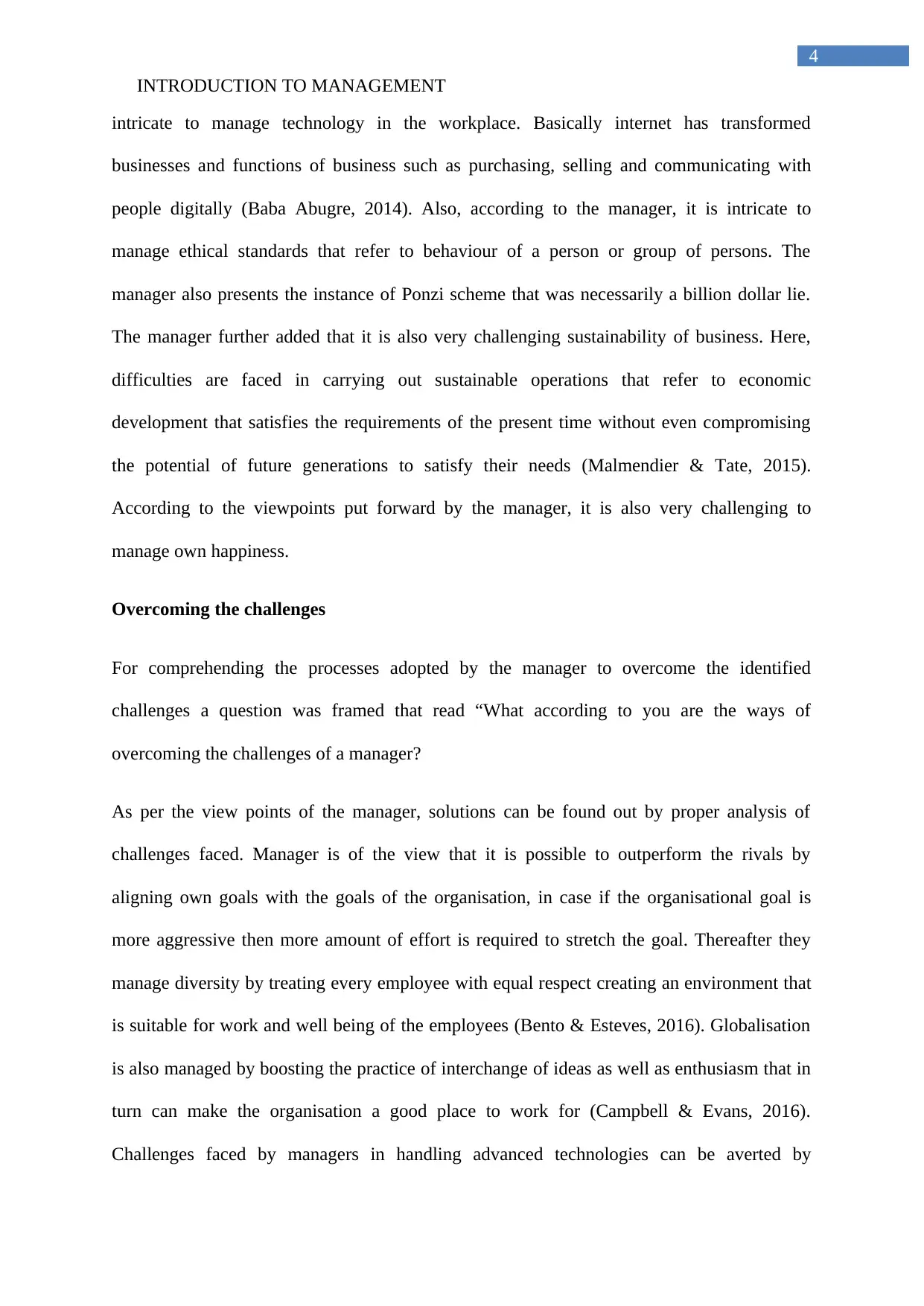
4
INTRODUCTION TO MANAGEMENT
intricate to manage technology in the workplace. Basically internet has transformed
businesses and functions of business such as purchasing, selling and communicating with
people digitally (Baba Abugre, 2014). Also, according to the manager, it is intricate to
manage ethical standards that refer to behaviour of a person or group of persons. The
manager also presents the instance of Ponzi scheme that was necessarily a billion dollar lie.
The manager further added that it is also very challenging sustainability of business. Here,
difficulties are faced in carrying out sustainable operations that refer to economic
development that satisfies the requirements of the present time without even compromising
the potential of future generations to satisfy their needs (Malmendier & Tate, 2015).
According to the viewpoints put forward by the manager, it is also very challenging to
manage own happiness.
Overcoming the challenges
For comprehending the processes adopted by the manager to overcome the identified
challenges a question was framed that read “What according to you are the ways of
overcoming the challenges of a manager?
As per the view points of the manager, solutions can be found out by proper analysis of
challenges faced. Manager is of the view that it is possible to outperform the rivals by
aligning own goals with the goals of the organisation, in case if the organisational goal is
more aggressive then more amount of effort is required to stretch the goal. Thereafter they
manage diversity by treating every employee with equal respect creating an environment that
is suitable for work and well being of the employees (Bento & Esteves, 2016). Globalisation
is also managed by boosting the practice of interchange of ideas as well as enthusiasm that in
turn can make the organisation a good place to work for (Campbell & Evans, 2016).
Challenges faced by managers in handling advanced technologies can be averted by
INTRODUCTION TO MANAGEMENT
intricate to manage technology in the workplace. Basically internet has transformed
businesses and functions of business such as purchasing, selling and communicating with
people digitally (Baba Abugre, 2014). Also, according to the manager, it is intricate to
manage ethical standards that refer to behaviour of a person or group of persons. The
manager also presents the instance of Ponzi scheme that was necessarily a billion dollar lie.
The manager further added that it is also very challenging sustainability of business. Here,
difficulties are faced in carrying out sustainable operations that refer to economic
development that satisfies the requirements of the present time without even compromising
the potential of future generations to satisfy their needs (Malmendier & Tate, 2015).
According to the viewpoints put forward by the manager, it is also very challenging to
manage own happiness.
Overcoming the challenges
For comprehending the processes adopted by the manager to overcome the identified
challenges a question was framed that read “What according to you are the ways of
overcoming the challenges of a manager?
As per the view points of the manager, solutions can be found out by proper analysis of
challenges faced. Manager is of the view that it is possible to outperform the rivals by
aligning own goals with the goals of the organisation, in case if the organisational goal is
more aggressive then more amount of effort is required to stretch the goal. Thereafter they
manage diversity by treating every employee with equal respect creating an environment that
is suitable for work and well being of the employees (Bento & Esteves, 2016). Globalisation
is also managed by boosting the practice of interchange of ideas as well as enthusiasm that in
turn can make the organisation a good place to work for (Campbell & Evans, 2016).
Challenges faced by managers in handling advanced technologies can be averted by
Paraphrase This Document
Need a fresh take? Get an instant paraphrase of this document with our AI Paraphraser
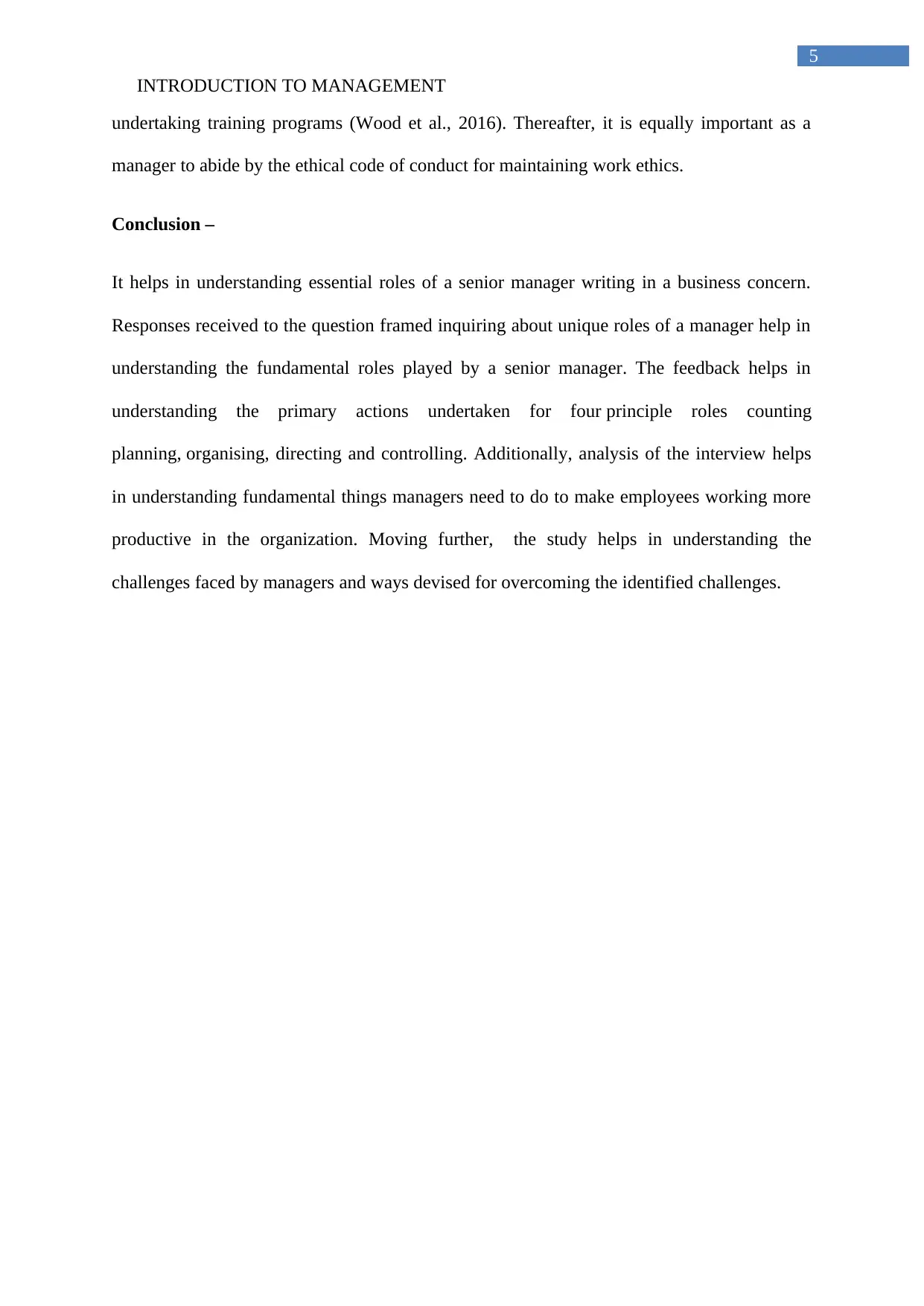
5
INTRODUCTION TO MANAGEMENT
undertaking training programs (Wood et al., 2016). Thereafter, it is equally important as a
manager to abide by the ethical code of conduct for maintaining work ethics.
Conclusion –
It helps in understanding essential roles of a senior manager writing in a business concern.
Responses received to the question framed inquiring about unique roles of a manager help in
understanding the fundamental roles played by a senior manager. The feedback helps in
understanding the primary actions undertaken for four principle roles counting
planning, organising, directing and controlling. Additionally, analysis of the interview helps
in understanding fundamental things managers need to do to make employees working more
productive in the organization. Moving further, the study helps in understanding the
challenges faced by managers and ways devised for overcoming the identified challenges.
INTRODUCTION TO MANAGEMENT
undertaking training programs (Wood et al., 2016). Thereafter, it is equally important as a
manager to abide by the ethical code of conduct for maintaining work ethics.
Conclusion –
It helps in understanding essential roles of a senior manager writing in a business concern.
Responses received to the question framed inquiring about unique roles of a manager help in
understanding the fundamental roles played by a senior manager. The feedback helps in
understanding the primary actions undertaken for four principle roles counting
planning, organising, directing and controlling. Additionally, analysis of the interview helps
in understanding fundamental things managers need to do to make employees working more
productive in the organization. Moving further, the study helps in understanding the
challenges faced by managers and ways devised for overcoming the identified challenges.
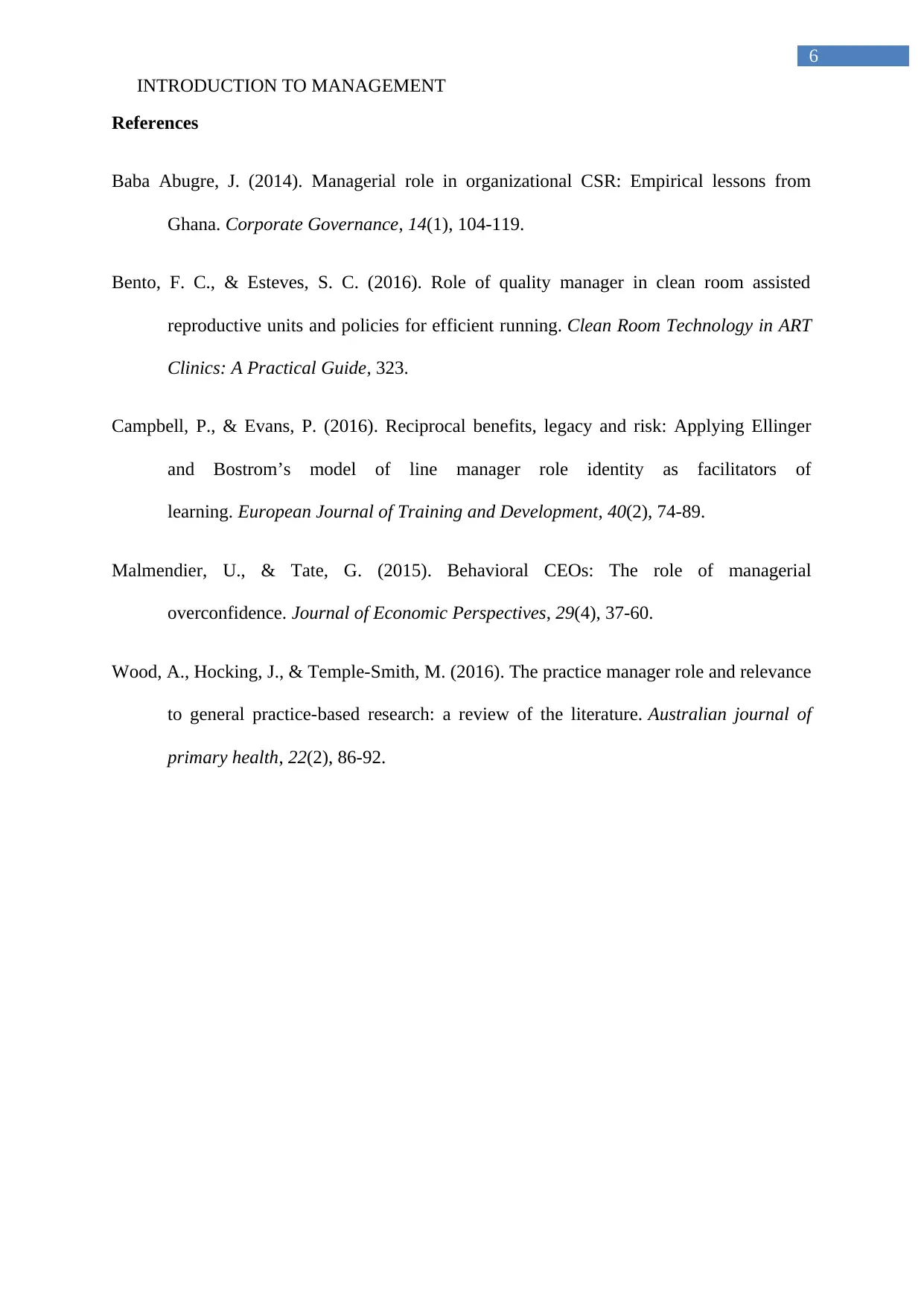
6
INTRODUCTION TO MANAGEMENT
References
Baba Abugre, J. (2014). Managerial role in organizational CSR: Empirical lessons from
Ghana. Corporate Governance, 14(1), 104-119.
Bento, F. C., & Esteves, S. C. (2016). Role of quality manager in clean room assisted
reproductive units and policies for efficient running. Clean Room Technology in ART
Clinics: A Practical Guide, 323.
Campbell, P., & Evans, P. (2016). Reciprocal benefits, legacy and risk: Applying Ellinger
and Bostrom’s model of line manager role identity as facilitators of
learning. European Journal of Training and Development, 40(2), 74-89.
Malmendier, U., & Tate, G. (2015). Behavioral CEOs: The role of managerial
overconfidence. Journal of Economic Perspectives, 29(4), 37-60.
Wood, A., Hocking, J., & Temple-Smith, M. (2016). The practice manager role and relevance
to general practice-based research: a review of the literature. Australian journal of
primary health, 22(2), 86-92.
INTRODUCTION TO MANAGEMENT
References
Baba Abugre, J. (2014). Managerial role in organizational CSR: Empirical lessons from
Ghana. Corporate Governance, 14(1), 104-119.
Bento, F. C., & Esteves, S. C. (2016). Role of quality manager in clean room assisted
reproductive units and policies for efficient running. Clean Room Technology in ART
Clinics: A Practical Guide, 323.
Campbell, P., & Evans, P. (2016). Reciprocal benefits, legacy and risk: Applying Ellinger
and Bostrom’s model of line manager role identity as facilitators of
learning. European Journal of Training and Development, 40(2), 74-89.
Malmendier, U., & Tate, G. (2015). Behavioral CEOs: The role of managerial
overconfidence. Journal of Economic Perspectives, 29(4), 37-60.
Wood, A., Hocking, J., & Temple-Smith, M. (2016). The practice manager role and relevance
to general practice-based research: a review of the literature. Australian journal of
primary health, 22(2), 86-92.
⊘ This is a preview!⊘
Do you want full access?
Subscribe today to unlock all pages.

Trusted by 1+ million students worldwide
1 out of 6
Related Documents
Your All-in-One AI-Powered Toolkit for Academic Success.
+13062052269
info@desklib.com
Available 24*7 on WhatsApp / Email
![[object Object]](/_next/static/media/star-bottom.7253800d.svg)
Unlock your academic potential
Copyright © 2020–2026 A2Z Services. All Rights Reserved. Developed and managed by ZUCOL.





